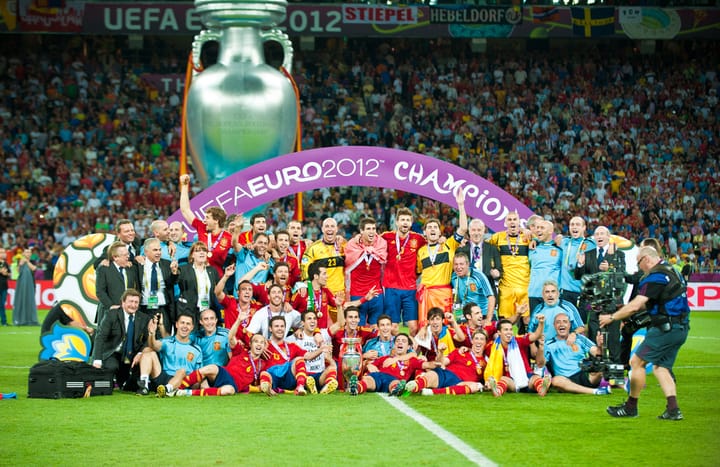From Past to Present: Tracing the History of Australia's National Soccer Team
This is the story of the Australian National Soccer Team.

The Australian men's national soccer team, widely recognized as the Socceroos, holds a prestigious place in international soccer. Controlled by Football Australia, the team is a member of the Asian Football Confederation (AFC) and has a storied history since their first international match in 1922. Over the years, the Socceroos have cultivated fierce rivalries and achieved remarkable milestones, proving their status in world soccer.
From early beginnings marked by struggles to historic achievements like winning the AFC Asian Cup and repeatedly qualifying for the FIFA World Cup, the journey of the Australian soccer team encapsulates the evolution of soccer in Australia. This article traces the Socceroos' path from their inaugural match against New Zealand to their current standing, showcasing the team's endurance, talent, and fervor that have driven their success on the international soccer scene.
Early Beginnings and Struggles
The early years of the Australian men's national soccer team, known as the Socceroos, were marked by significant challenges and developmental milestones that shaped the future of Australian soccer. Established in 1922, the team faced its first international test against New Zealand, resulting in a 3-1 defeat. This match set the stage for a series of competitive encounters and learning opportunities for the team.
Key Early Matches and Campaigns:
First International Match (1922): The Socceroos played their inaugural match on June 17, 1922, against New Zealand, suffering a 3-1 defeat.
Olympic Debut (1956): Australia made its first significant international tournament appearance at the 1956 Melbourne Olympics. They secured a victory against Japan but were ousted by India with a 4-2 score in the quarter-finals.
World Cup Qualification Attempts:
1965 Campaign: The Socceroos faced North Korea in their first attempt to qualify for the FIFA World Cup, enduring heavy defeats of 6-1 and 3-1 in the qualifying matches.
Subsequent Efforts (1966–1990): Despite spirited campaigns, including victories over teams like Japan, South Korea, and Rhodesia, Australia failed to qualify for the World Cup during these years.
Challenges and Struggles:
Geographical Isolation: Throughout the 1960s, the advent of cheap air travel somewhat mitigated Australia's geographical isolation. Despite this, the Socceroos still faced limited opportunities to compete against a diverse range of international teams.
Early Defeats: The team's formative years were also punctuated by heavy losses, such as a 17-0 defeat to England in 1951, highlighting the developmental gap between Australia and established soccer nations.
These early experiences were crucial in the evolution of the Socceroos, setting a foundation of resilience and continuous improvement that would eventually lead to significant achievements on the international soccer stage.
1974 World Cup: The First Breakthrough
The 1974 FIFA World Cup marked a significant milestone for Australian soccer, as it was the first time the national team qualified for the tournament. Under the guidance of coach Rale Rasic, the Australian team, often referred to as the Socceroos, embarked on a challenging journey through the qualification rounds to secure their place in the World Cup held in West Germany.
Qualification Details:
Against Iran: Australia secured their World Cup spot by winning a two-legged playoff against Iran.
Deciding Match: The team clinched their qualification after defeating South Korea in a crucial match held in Hong Kong.
Record: Throughout the qualification campaign, Australia's record stood at 5 wins, 5 draws, and only 1 loss in 11 games.
1974 World Cup Group 1 Draw:
Teams: Australia was drawn into Group 1 with host nation West Germany, East Germany, and Chile.
Match Outcomes:
Lost to East Germany 2-0
Lost to West Germany 3-0
Drew with Chile 0-0, earning their first World Cup point
This section of Australia's soccer history not only highlights their participation in the 1974 World Cup but also underscores the significant role of migrants in shaping the national team’s dynamics and success on the international stage.
The Wilderness Years
The period following the 1974 World Cup breakthrough for the Australian soccer team, often referred to as "The Wilderness Years," was characterized by a series of challenges and setbacks that stymied the team's progress on the international stage. Despite their efforts, the Socceroos failed to qualify for the World Cups of 1978, 1982, 1986, and 1990, reflecting a phase of near misses and disappointment.
Key Events and Performances:
Oceania Cup Achievements: The team saw some success in regional competitions, securing the Oceania Cup in 1996 and 2000, and finishing as runners-up in 1998 and 2002.
1998 Qualifying Campaign: One of the most heart-wrenching moments came during the 1998 World Cup qualifiers when Australia, needing a clear win, drew 2-2 with Iran, thus losing the chance to advance due to the away goals rule, with the aggregate score at 3-3.
Despite the setbacks, this era also saw the emergence of talented players who would later play significant roles in the team's successes. The struggles of the Australian soccer team during these years not only highlight the difficulties faced but also underscore the resilience of the team and the broader Australian soccer community's commitment to nurturing and developing the sport. This commitment would eventually lead to significant improvements and achievements in subsequent years.
Golden Generation and 2006 World Cup
The year 2006 marked a pivotal moment in the history of the Australian soccer team, often referred to as the Socceroos. This era is celebrated as the "Golden Generation" due to the remarkable achievements and the caliber of players representing Australia at the international level.
Group F Matches:
Vs Japan (June 12): Triumphed with a score of 3-1, featuring two goals from Tim Cahill and one from John Aloisi.
Vs Brazil (June 18): Faced a defeat with a score of 0-2.
Vs Croatia (June 22): Drew 2-2, a match that, combined with Brazil’s 4-1 victory over Japan, allowed Australia to advance to the next round.
Round of 16 and Team Dynamics:
Vs Italy (June 26): The Socceroos' journey concluded with a narrow defeat, as Italy, who eventually became World Champions in 2006, scored a penalty goal in the final moments of the match.
The team's composition reflected a blend of experienced international players, contributing significantly to their competitive performance. Following their commendable performance in the World Cup, the Socceroos were honored as the AFC National Team of the Year.
The momentum continued with successful qualifications for the Asian Cup, topping their group with matches against Bahrain and Kuwait.
This period not only highlights the Socceroos' capabilities on the global stage but also underscores the strategic preparations and resilience that characterized Australia's 2006 World Cup campaign.
Transition to Asia and Recent Achievements
The transition of the Australian soccer team, the Socceroos, to the Asian Football Confederation (AFC) in 2006 marked a significant strategic shift in Australian soccer. This move facilitated new challenges and opportunities, enhancing Australia's competitive edge on a broader international stage.
AFC Asian Cup Victory (2015): The Socceroos clinched their first Asian Cup title in 2015, a momentous achievement that highlighted their successful integration into Asian soccer.
These milestones not only reflect the Socceroos' prowess but also their growing influence in Asian soccer, demonstrating a successful transition and the fostering of cross-cultural exchanges in the sport.
Through the decades, the Australian men's national soccer team, the Socceroos, have charted a path of remarkable evolution, from their early challenges and formative defeats to the historic breakthrough of the 1974 World Cup and onto the golden era of 2006 and recent successes in the Asian Football Confederation. This journey not only underscores the team's resilience and dedication but also highlights the significant role of multiculturalism and strategic shifts in redefining Australian soccer's identity and presence on the international stage. Their story is a testament to the spirit of continuous improvement and the enduring passion that fuels both players and supporters alike.




